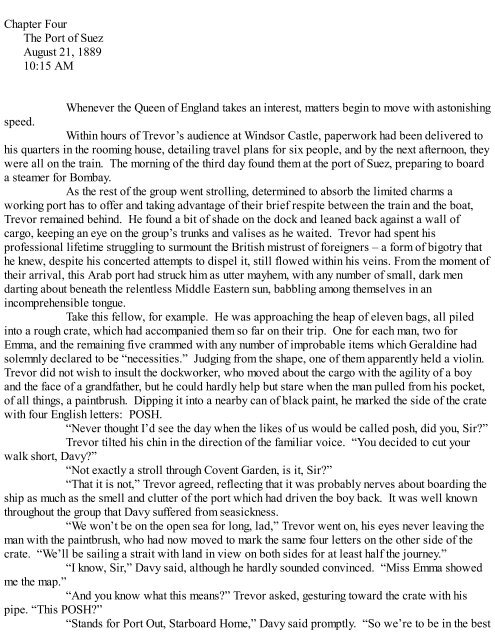You also want an ePaper? Increase the reach of your titles
YUMPU automatically turns print PDFs into web optimized ePapers that Google loves.
Chapter Four<br />
The Port of Suez<br />
August 21, 1889<br />
10:15 AM<br />
Whenever the Queen of England takes an interest, matters begin to move with astonishing<br />
speed.<br />
Within hours of Trevor’s audience at Windsor Castle, paperwork had been delivered to<br />
his quarters in the rooming house, detailing travel plans for six people, and by the next afternoon, they<br />
were all on the train. The morning of the third day found them at the port of Suez, preparing to board<br />
a steamer for Bombay.<br />
As the rest of the group went strolling, determined to absorb the limited charms a<br />
working port has to offer and taking advantage of their brief respite between the train and the boat,<br />
Trevor remained behind. He found a bit of shade on the dock and leaned back against a wall of<br />
cargo, keeping an eye on the group’s trunks and valises as he waited. Trevor had spent his<br />
professional lifetime struggling to surmount the British mistrust of foreigners – a form of bigotry that<br />
he knew, despite his concerted attempts to dispel it, still flowed within his veins. From the moment of<br />
their arrival, this Arab port had struck him as utter mayhem, with any number of small, dark men<br />
darting about beneath the relentless Middle Eastern sun, babbling among themselves in an<br />
incomprehensible tongue.<br />
Take this fellow, for example. He was approaching the heap of eleven bags, all piled<br />
into a rough crate, which had accompanied them so far on their trip. One for each man, two for<br />
Emma, and the remaining five crammed with any number of improbable items which Geraldine had<br />
solemnly declared to be “necessities.” Judging from the shape, one of them apparently held a violin.<br />
Trevor did not wish to insult the dockworker, who moved about the cargo with the agility of a boy<br />
and the face of a grandfather, but he could hardly help but stare when the man pulled from his pocket,<br />
of all things, a paintbrush. Dipping it into a nearby can of black paint, he marked the side of the crate<br />
with four English letters: POSH.<br />
“Never thought I’d see the day when the likes of us would be called posh, did you, Sir?”<br />
Trevor tilted his chin in the direction of the familiar voice. “You decided to cut your<br />
walk short, Davy?”<br />
“Not exactly a stroll through Covent Garden, is it, Sir?”<br />
“That it is not,” Trevor agreed, reflecting that it was probably nerves about boarding the<br />
ship as much as the smell and clutter of the port which had driven the boy back. It was well known<br />
throughout the group that Davy suffered from seasickness.<br />
“We won’t be on the open sea for long, lad,” Trevor went on, his eyes never leaving the<br />
man with the paintbrush, who had now moved to mark the same four letters on the other side of the<br />
crate. “We’ll be sailing a strait with land in view on both sides for at least half the journey.”<br />
“I know, Sir,” Davy said, although he hardly sounded convinced. “Miss Emma showed<br />
me the map.”<br />
“And you know what this means?” Trevor asked, gesturing toward the crate with his<br />
pipe. “This POSH?”<br />
“Stands for Port Out, Starboard Home,” Davy said promptly. “So we’re to be in the best
















